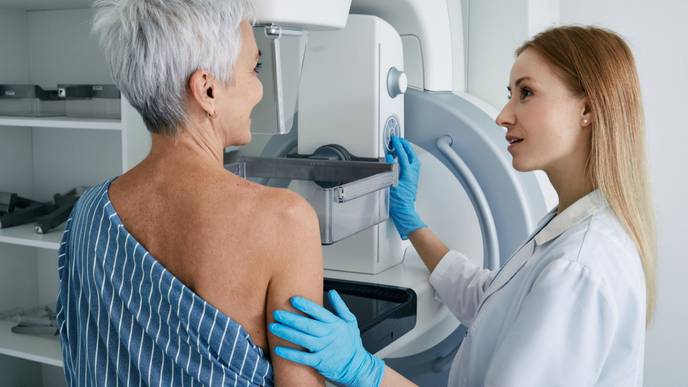A new AI tool from Kheiron Medical Technologies and Imperial College London can detect up to 13% more breast cancers than humans in breast screenings.
The prospective evidence, published in Nature Medicine, found that the tool, called Mia, could significantly increase the early detection of breast cancers in a European healthcare setting by up to 13%.
In 2020, 2.3 million women were diagnosed with breast cancer worldwide, and 685,000 women died from the disease, according to the World Health Organization. Screening initiatives to detect cancer early reduce the amount of intensive treatments and deaths from breast cancer. However, despite these initiatives, it is estimated that about 20% of breast cancers might be missed at this stage.
These results have exceeded our expectations. Our study shows that using AI can act as an effective safety net – a tool to prevent subtler signs of cancer falling through the cracks. Dr Ben Glocker Department of Computing & Kheiron
Researchers have found that using an artificial intelligence (AI) tool called Mia (CE Mark class IIa) has the potential to improve breast cancer screening by spotting potentially cancerous tissue that human ‘readers’ might miss.
In Hungary, where the study took place and the gold-standard of double-reading every case is followed, mammograms are analysed by two radiologists who then decide, based on whether they suspect cancerous tissue, whether to ask the woman to come back for further investigation, known as ‘recall’.
In this study, the researchers used Mia as an extra ‘reader’ for the mammograms of 25,065 women across four screening sites in Hungary from April 2021 to January 2023. After mammograms were studied as usual by two radiologists, they were then fed through Mia, which flagged potential false negatives to a third human reader, who decided whether to recall the woman. These were defined as mammograms that were deemed healthy by humans but had subtler signs of cancerous tissue picked up by Mia.
Our prospective real-world usage data in Hungary provides evidence for a significant, measurable increase of early breast cancer detection when Mia is used in clinical practice. Dr Peter Kecskemethy CEO, Kheiron
The study was conducted over three phases (two pilot phases and a live roll-out). Overall across the three phases, the AI reader found 24 more cancers than the standard human reading – a 7% relative increase – and resulted in 70 more women recalled (0.28% relative increase).
Of the additional recalls, 6 (initial pilot), 13 (extended pilot), and 11 (live use) additional cancers were found, increasing relative cancer detection rate by 13%, 10%, and 5% respectively.
They found that 83% of the additional cancers detected using Mia in real clinical practice were invasive, showing that Mia can detect cancers where early detection is particularly vital.
Dr Peter Kecskemethy, CEO of Kheiron, said: “Our prospective real-world usage data in Hungary provides evidence for a significant, measurable increase of early breast cancer detection when Mia is used in clinical practice. The key question now is how we can justify not using Mia in breast screening when there is such a dramatic improvement in cancer detection.”
Study co-author Dr Ben Glocker from Imperial’s Department of Computing, who leads machine learning research teams at Imperial and Kheiron, said: “These results have exceeded our expectations. Our study shows that using AI can act as an effective safety net – a tool to prevent subtler signs of cancer falling through the cracks. Seeing first hand that the use of AI could substantially reduce the rate of missed cancers in breast screening is massive, and a major boost for our mission to transform cancer care with AI technology.”
The researchers note that an important next step is to replicate the results in other countries with varying screening programmes and populations. They also note that patients were followed up for two to nine months, and longer follow up will be needed to assess Mia’s full effect in terms of cancer detection and reducing mortality.
An ongoing study in the UK, which is about to conclude, is aiming to confirm the benefits of the AI-assisted extra reader workflow, and the team is beginning a roll-out in the US.
We are working hard to make sure that as many women as possible will benefit from the use of this new technology within the next year. Dr Ben Glocker Department of Computing & Kheiron
Ali Baron, Patient and Public Board Member to Kheiron, said: “I was diagnosed in late 2019 with ductal carcinoma in situ. The radiologist highlighted that it was ‘good luck’ that it was caught early. I want to take the luck out of this.
“I would love for Mia to be in place and know that this was working in the background to help radiologists. This technology should be there for all women.”
Dr Glocker added: “This is just the beginning of our work with Kheiron. We are actively working on new methodologies for the safe deployment and continuous monitoring of Mia to support a US and UK rollout. We are working hard to make sure that as many women as possible will benefit from the use of this new technology within the next year.”
This work was funded by Kheiron Medical Technologies Ltd.
"Prospective implementation of AI-assisted screen reading to improve early detection of breast cancer" by Annie Y. Ng et al., published 16 November 2023 in Nature Medicine.
Image: Shutterstock

Facebook Comments